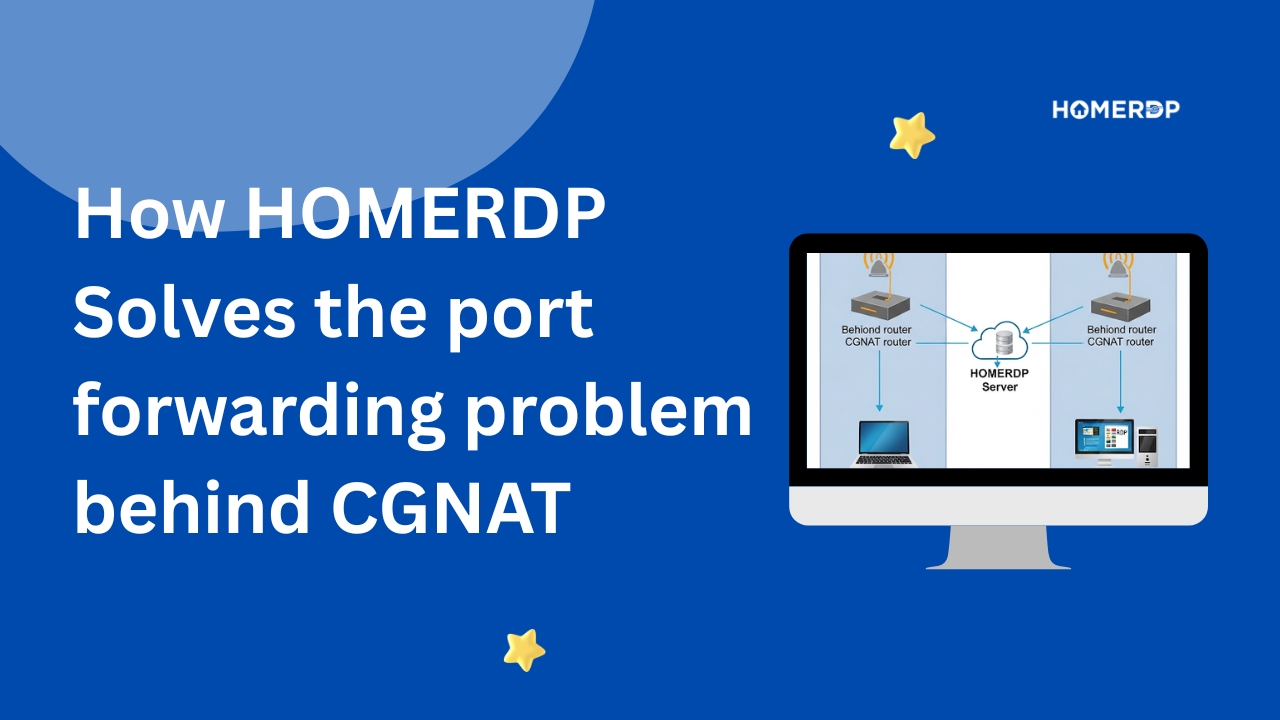Practical CGNAT Port Forwarding Workarounds

Remote access has become essential for developers, traders, gamers, and businesses. But there’s a roadblock many users face—Carrier-Grade NAT (CGNAT). ISPs often deploy CGNAT to conserve IPv4 addresses, but it blocks traditional port forwarding, making it extremely difficult to connect to home servers or devices from outside.
This article explores practical CGNAT port forwarding workarounds, highlights their pros and cons, and shows why HOMERDP provides a superior, secure, and performance-driven alternative.
1. Understanding the CGNAT Hurdle
- CGNAT assigns multiple users a shared public IP, which means you don’t truly control inbound traffic.
- Traditional port forwarding fails because your ISP blocks direct external access to your device.
- Result: You can’t host game servers, run a Forex trading bot, or even access your own PC remotely without complex workarounds.
2. Why Traditional Port Forwarding Isn’t Enough
Even if you bypass CGNAT, simple port forwarding isn’t safe. Exposing RDP directly to the internet:
- Opens the door to brute-force attacks and unauthorized logins.
- Requires constant management—changing default ports, enabling firewalls, and patching vulnerabilities.
- Adds complexity when you just want fast, stable, and secure access.
3. Popular Workarounds for CGNAT Port Forwarding
- VPN Tunneling
- A VPN can create a secure tunnel that bypasses CGNAT and allows external access.
- Downsides: Additional latency, manual setup, and reliance on third-party VPN providers.
- Portmap.io
- Offers free TCP/UDP forwarding by creating a VPN tunnel to bypass CGNAT.
- Downsides: Requires technical setup and doesn’t include advanced security features.
- HomeLabHost
- Provides dedicated public IPs with port forwarding through an online portal.
- Downsides: Extra recurring costs and the burden of self-managing firewall/security rules.
While these solutions work, they often require time, technical skills, or additional tools—not ideal if your priority is speed and productivity.

4. Why HOMERDP is the Superior Choice
HOMERDP eliminates the need for CGNAT workarounds altogether. Instead of battling port forwarding, you get ready-to-go RDP/VPS servers with global access.
Here’s why users choose HOMERDP:
- Dedicated Public IPs: Every server comes with its own IP, giving you unrestricted inbound/outbound access.
- Global Infrastructure: Data centers in the USA, Germany, India, Singapore, and beyond ensure low-latency access.
- Full Admin/Root Rights: You control firewalls, ports, and software without ISP restrictions.
- Optimized Performance: Choose from standard RDP, Forex RDP, Gaming RDP, or GPU RDP depending on your workload.
- Built-In Security: Free DDoS protection, secure authentication, and optional backups safeguard your work.
- User-Friendly Dashboard: One-click reboots, OS reinstalls, and 24/7 live support—no technical expertise required.
Instead of struggling with patchwork fixes, HOMERDP delivers a stable, secure, and scalable remote desktop experience out of the box.
5. Workaround Comparison: Portmap.io vs HomeLabHost vs HOMERDP
| Solution | Key Benefit | Drawbacks/Notes |
|---|---|---|
| Portmap.io | Free port forwarding via VPN tunnel | Technical setup required; limited security features |
| HomeLabHost | Public IP + simple firewall configuration | Monthly costs; user must manage their own security setup |
| HOMERDP | Fully managed RDP/VPS with dedicated IP | Paid service—but includes performance, security, and ease |
6. Real-World Use Cases of HOMERDP
- Remote Developers: Build and test applications in secure, high-performance environments without CGNAT restrictions.
- Forex Traders: Execute trades faster with low-latency Forex RDP servers.
- Gamers: Host and play on powerful gaming RDPs without worrying about ISP limitations.
- Data Scientists: Train ML models on GPU RDPs without bottlenecks or local resource limits.
- Businesses & Teams: Ensure secure remote workstations for employees across geographies.
Conclusion
CGNAT makes traditional port forwarding difficult, insecure, and unreliable. While VPNs, Portmap.io, and HomeLabHost offer workarounds, they demand extra time, setup, and management.
With HOMERDP, you skip the hassle. You get dedicated IPs, global RDP servers, top-tier performance, and built-in security, all managed through a simple dashboard.
👉 Ready to break free from CGNAT limitations? Explore HOMERDP’s plans and experience secure, seamless remote access today.
EXPLORE MORE; Optimizing GPU RDPs for Machine Learning and Data Science Projects
READ OUR BLOGS


